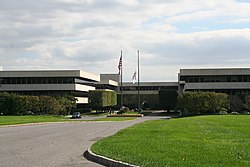
Back PepsiCo Afrikaans بيبسيكو Arabic PepsiCo AST PepsiCo Azerbaijani پپسیکو AZB PepsiCo Byelorussian ПепсиКо Bulgarian পেপসিকো Bengali/Bangla PepsiCo Catalan PepsiCo Czech
 Logo used since 2001 | |
 PepsiCo's global headquarters in Harrison, New York | |
| Company type | Public |
|---|---|
| |
| Industry | |
| Predecessor | Pepsi-Cola Company Frito-Lay, Inc. |
| Founded |
|
| Founder | Caleb Bradham (for the Pepsi-Cola Company branch) |
| Headquarters | Harrison, New York, U.S. , U.S. |
Area served | Worldwide |
Key people | Ramon Laguarta (chairman & CEO) Jamie Caulfield (EVP and CFO) |
| Products | See list of PepsiCo products |
| Revenue | |
| Total assets | |
| Total equity | |
Number of employees | 318,000 (2023) |
| Subsidiaries | List of subsidiaries |
| Website | pepsico |
| Footnotes / references [1] | |
PepsiCo, Inc. is an American multinational food, snack, and beverage corporation headquartered in Harrison, New York, in the hamlet of Purchase. PepsiCo's business encompasses all aspects of the food and beverage market. It oversees the manufacturing, distribution, and marketing of its products. PepsiCo was formed in 1965 with the merger of the Pepsi-Cola Company and Frito-Lay, Inc., PepsiCo has since expanded from its namesake product Pepsi Cola to an immensely diversified range of food and beverage brands. The largest and most recent acquisition was Pioneer Foods in 2020 for US$1.7 billion[2] and prior to it was buying the Quaker Oats Company in 2001, which added the Gatorade brand to the Pepsi portfolio and Tropicana Products in 1998.
As of January 2021, the company possesses 23 brands that have over 1 billion $ each in sales annually.[3] PepsiCo has operations all around the world and its products were distributed across more than 200 countries and territories, resulting in annual net revenues of over US$70 billion. PepsiCo is the second-largest food and beverage business in the world based on net revenue, profit, and market capitalization, behind Nestlé. In 2023, the company's seat in Forbes Global 2000 was 82.[4] PepsiCo's flagship product, Pepsi Cola has been engaged in a rivalry for generations with Coca-Cola; it is commonly referred to as the cola wars. Although Coca-Cola outsells Pepsi Cola in the United States, PepsiCo within the North American market is the largest food and beverage company by net revenue. Ramon Laguarta has been the chief executive of PepsiCo since 2018. The company's beverage distribution and bottling is conducted by PepsiCo as well as by licensed bottlers in certain regions.
Pepsi has been repeatedly criticized by environmentalists for its relationship to negative environmental impacts of agriculture in its supply chain and in its distributing operations, such as palm oil–related deforestation and pesticide use, its use of water resources, and the negative impacts of its packaging—Pepsi's packaging has consistently been one of the top sources of plastic pollution globally.[5] Similarly public health advocates have criticized Pepsi's high-calorie, poor nutrition product lines along with other popular snack and drink manufacturers. In response PepsiCo has made public comments on its commitment to minimizing their impact but has not released public information documenting progress on most of its public commitments.
- ^ "PepsiCo, Inc. 2023 Annual Report (Form 10-K)". U.S. Securities and Exchange Commission. February 9, 2024.
- ^ Child, Katharine (March 6, 2020). "PepsiCo purchase of Pioneer is finalised". Business Live. Retrieved December 9, 2021.
- ^ "About PepsiCo". PepsiCo, Inc. Official Website. Retrieved February 26, 2024.
- ^ "The Global 2000 2023". Forbes. Archived from the original on January 29, 2024. Retrieved February 7, 2024.
- ^ McVeigh, Karen (December 7, 2020). "Coca-Cola, Pepsi and Nestlé named top plastic polluters for third year in a row". The Guardian. ISSN 0261-3077. Retrieved March 29, 2021.